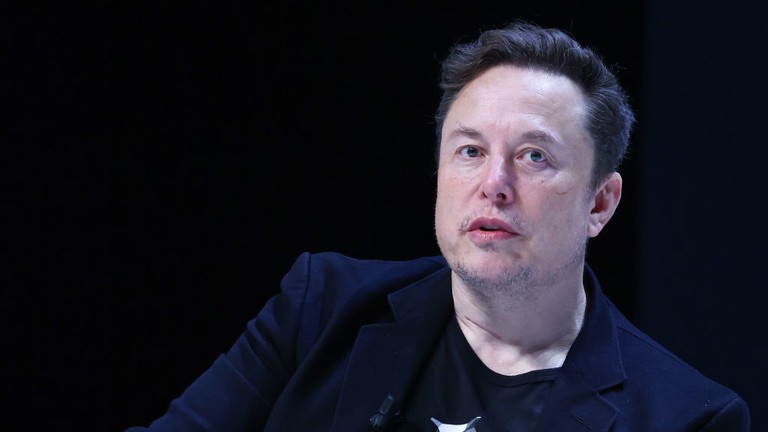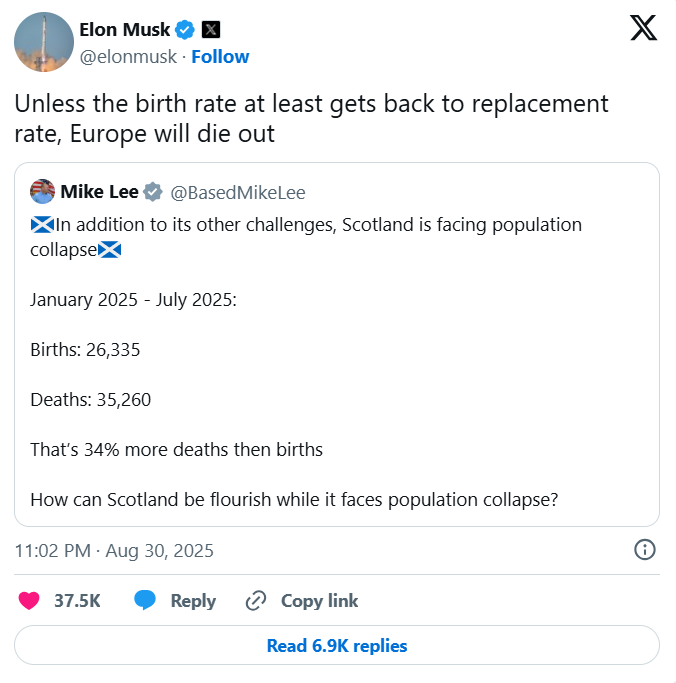
Elon Musk, the billionaire entrepreneur behind Tesla, SpaceX, and X, has issued a stark warning about the future of Europe, claiming that the continent faces the risk of “demise” if it fails to address its plummeting birth rates. In a post on X on August 30, 2025, Musk highlighted alarming demographic trends, pointing to data from Scotland showing that deaths in the first half of 2025 exceeded births by 34%. “Unless birth rates at least return to replacement levels, Europe will perish,” Musk wrote, emphasizing the urgency of reversing the continent’s declining population trends.
The Demographic Crisis in Europe
Musk’s warning comes at a time when Europe is grappling with historically low fertility rates and an aging population, which together pose significant challenges to the continent’s economic and social stability. The replacement fertility rate—the average number of children per woman needed to maintain a stable population without immigration—is typically set at 2.1, accounting for infant mortality and gender balance at birth. However, recent studies suggest that even this figure may be insufficient, with some experts proposing a “survival threshold” closer to 2.7 children per woman to ensure long-term demographic stability.
Data from the United Kingdom’s Office for National Statistics (ONS) paints a grim picture. In 2024, the fertility rate in England and Wales dropped to 1.4 children per woman, while Scotland recorded an even lower rate of 1.3. Across the European Union, the average fertility rate has been steadily declining, reaching a record low of 1.4 children per woman in 2023. These figures fall far short of the replacement level, signaling a potential demographic collapse if trends persist.
The consequences of low birth rates are already evident. An aging population, coupled with a shrinking workforce, places immense pressure on pension systems, healthcare infrastructure, and economic productivity. Without a sufficient number of younger workers to support the elderly, European nations risk facing labor shortages, reduced economic growth, and strained public finances. Musk’s warning underscores the gravity of this crisis, framing it as an existential threat to the continent’s future.
Musk’s Advocacy for Higher Birth Rates
Elon Musk has been a vocal advocate for increasing birth rates, both in Europe and globally. A father of at least 14 children, Musk has consistently emphasized the importance of population growth for the survival of human civilization. He has donated millions of dollars to research on fertility and reproductive health, reflecting his personal commitment to addressing the issue. Musk’s public statements often frame declining birth rates as a more pressing threat to humanity than climate change, a perspective that has sparked both support and controversy.

In his August 30 post, Musk reiterated his belief that “civilization will collapse” if birth rates do not improve. He has previously described low fertility rates as “the greatest danger facing humanity,” arguing that a shrinking population undermines the ability of societies to innovate, sustain economic growth, and maintain cultural vitality. For Musk, the solution lies in encouraging higher birth rates through policy incentives, cultural shifts, and technological advancements in reproductive health.
Global Trends in Declining Birth Rates
The demographic challenges facing Europe are part of a broader global trend. According to United Nations data, the global fertility rate has been declining for over five decades, falling from 5 children per woman in the 1970s to 3.3 in the 1990s and approximately 2.2 in 2024. Only 45% of countries and territories—representing about one-third of the world’s population—currently meet or exceed the replacement fertility rate of 2.1. Regions with higher fertility rates, such as sub-Saharan Africa, Afghanistan, Sudan, and Yemen, account for just 13% of the global population, with fertility rates of 4.0 or higher.
This global decline in birth rates reflects a combination of factors, including increased access to education and employment opportunities for women, urbanization, rising costs of raising children, and changing cultural attitudes toward family size. While these developments have brought significant social and economic benefits, they have also contributed to a demographic shift that threatens long-term population sustainability.
In Europe, the decline in birth rates is particularly pronounced due to a combination of economic pressures, high living costs, and shifting societal priorities. Many young Europeans delay or forgo having children due to financial instability, career demands, and a lack of affordable childcare. Governments across the continent have introduced policies such as parental leave, childcare subsidies, and tax incentives to encourage higher birth rates, but these measures have so far failed to reverse the downward trend.
The Case of Russia
The demographic crisis is not limited to Europe. Russia, for example, is facing its own population challenges. According to Rosstat, the country’s statistical agency, Russia recorded just 1.2 million births in 2024—the lowest since 1999—corresponding to a fertility rate of 1.4 children per woman. Like Europe, Russia is grappling with an aging population and a shrinking workforce, which threaten its economic and geopolitical ambitions. The Russian government has implemented pronatalist policies, including financial incentives for families with multiple children, but these efforts have had limited success in reversing the decline.
Broader Implications and Potential Solutions
The implications of declining birth rates extend beyond Europe and Russia, posing challenges for the global economy and societal structures. A shrinking population can lead to reduced consumer demand, lower tax revenues, and decreased innovation, all of which undermine long-term economic stability. Moreover, an aging population places increasing demands on healthcare and pension systems, creating fiscal burdens for governments.
Addressing the demographic crisis requires a multifaceted approach. Policymakers could explore measures such as expanding access to affordable childcare, offering financial incentives for families, and promoting work-life balance to make parenting more feasible for young couples. Cultural campaigns to highlight the value of family and parenthood could also help shift societal attitudes. Additionally, advancements in reproductive technologies, such as those supported by Musk’s philanthropy, could make it easier for individuals to have children later in life.
Immigration is another potential solution to offset population decline, as it can bolster the workforce and contribute to economic growth. However, immigration policies in Europe have often been politically contentious, and integrating large numbers of newcomers poses its own set of challenges. Musk’s warning emphasizes the need for proactive measures to address the root causes of declining birth rates rather than relying solely on immigration to fill demographic gaps.
Conclusion
Elon Musk’s warning about Europe’s potential “demise” serves as a wake-up call for policymakers, economists, and society at large. The continent’s record-low birth rates, coupled with an aging population, threaten its long-term viability and global influence. While Musk’s rhetoric may sound alarmist, it underscores a critical issue that demands urgent attention. Without significant efforts to boost fertility rates or address the consequences of population decline, Europe risks facing a future marked by economic stagnation and social challenges.
As the world grapples with similar demographic trends, Musk’s call to action resonates beyond Europe. The global decline in birth rates highlights the need for innovative solutions to ensure the sustainability of human civilization. Whether through policy reforms, cultural shifts, or technological advancements, addressing the demographic crisis will require bold and coordinated efforts on a global scale. For now, Musk’s warning serves as a reminder that the future of humanity depends on our ability to adapt to these challenges and prioritize population growth.


